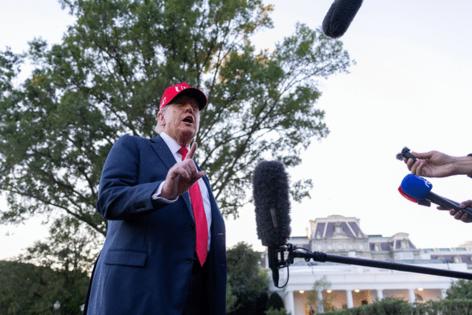Commentary: The role of race in Trump's authoritarianism
Published in Op Eds
Back-to-school season looked starkly different for my family this year. Instead of joyfully stuffing backpacks, dressing up for school days to come and taking toothy front-porch photos, my spouse and I found ourselves having a serious discussion: How would we get our kids to school safely as federal agents and the National Guard roamed the streets of Washington, D.C., where we live?
I’m a Black man raising Black girls. And, if you’re paying attention, you know why we have to move differently through the world. President Donald Trump’s militarization of Washington, and now my home city of Chicago, is especially dangerous for us and people like us.
Frankly, I’m enraged that what should be a joyful time for my family was transformed into a month of fear, hypervigilance and hard conversations with my five-year-old. As we walk hand-in-hand to her school, she sees the Immigration and Customs Enforcement agents and armed National Guard members standing on the corner. She notices that some of her classmates aren’t coming to school because it’s no longer a safe place for them to be.
My blood boils knowing she’s seeing and processing things that no kid her age should have to. But I also know I cannot live in anger all the time; I have to find a way for me and my family to keep living.
One source of comfort has been talking to my mom, who lives on the South Side of Chicago. She’s 84 years old, the granddaughter of sharecroppers who fled to the North to escape racial terror. She grew up in the same neighborhood as Emmett Till, and they would be the same age today had he not been brutally lynched in 1955. Talking with her reminds me that our people have risen to challenging times like this before and worked together to build something better from the wreckage.
My family knows this truth deeply, because their migration to the North offered no respite from racism. In 1919, when my great-grandmother was eight months pregnant, she fell running from the chaos of the Chicago Race Riots. She was okay, but our neighborhood underwent five days of chaos, fear and terror — similar to what my neighbors are experiencing today.
The legacy I inherited from my family is one of organizing, community and protest, rooted in a need to respond to what was going on around us. Now both of “my” cities are under federal military occupation, with federal agents doing their best to turn the streets of Chicago into a war zone.
It’s no coincidence that the cities Trump is threatening to take over have Black mayors. Trying to delegitimize Black leadership is textbook racial authoritarianism — it’s how white supremacists have hoarded so much power over the years. They did the same during the Reconstruction and Civil Rights eras.
But we can’t remember our country’s worst moments without also recalling the times in which ordinary people responded by working to organize, connect, rebuild and dare to envision a better future. Black people have a rich tradition of collective organizing and action. We’re good at this. I wish we didn’t have to be.
With my own family’s history to lean on, I can offer this advice: Honor your feelings. Get angry, feel despair, but dare to be honest about what’s happening here. We are experiencing actual authoritarianism. It’s not normal for masked agents to snatch people off the street, launch attacks on free speech or deploy the military against civilians. It’s not normal for my five-year-old to have to worry about her classmates or their parents disappearing.
Another bit of advice: Remember who you are and who you come from. Our history reminds us that we have done this before, and that resistance is in our DNA.
The world I dream of cares for the sick, keeps people safe, ensures that no one goes hungry and guarantees everyone the freedom to make a good life for themselves. Let’s emphasize the things that connect us instead of what makes us different. Our past is our truest blueprint for moving forward.
_____
Dorian Warren is a longtime organizer and progressive scholar who has worked to advance racial, economic and social justice for more than two decades; he serves as co-president of Community Change and Community Change Action. This column was produced for Progressive Perspectives, a project of The Progressive magazine, and distributed by Tribune News Service.
_____
©2025 Tribune Content Agency, LLC.
























































Comments